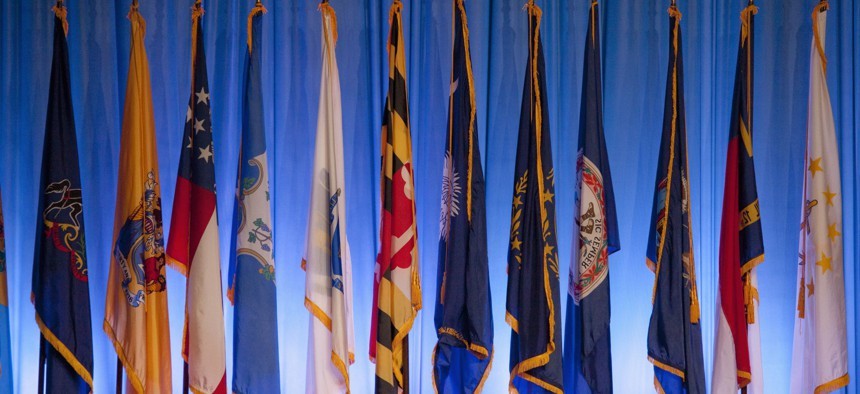Do More Americans Prefer State or Federal Power?

Shutterstock

Connecting state and local government leaders
A new Gallup survey takes a look.
Concentrating power at the state level is the theory of government 55 percent of Americans favor, according to a Gallup poll conducted late last month.
That figure is greater than the 37 percent who the survey found prefer concentrating power with the federal government. Of those surveyed, 8 percent had no opinion on the topic. State and federal power dynamics can cut across a wide variety of hot button policy issues, such as immigration, health care, marijuana legalization and control over public lands.
As of last Friday, 21 states had mounted legal challenges against the federal government over guidance the U.S. Department of Justice and U.S. Department of Education issued in May, cautioning states that federal funds they receive could be put at risk if transgender students are denied access to school restrooms and locker rooms that align with their gender identity.
Gallup has asked about American’s preferences for concentrating government power at the state or federal level two times previously, once in 1936 and again in 1981, according to an article published Monday on the company’s website about the latest survey.
The 1981 poll found the proportion of Americans favoring state power to be 56 percent, about the same as it is in the new survey. But the level of support for federal power was lower, at 28 percent. And there was a greater degree of people with no opinion: 16 percent.
In the 1936 survey, 44 percent of people favored concentrating power with state government, and 56 percent with the federal government.
The Gallup article detailing the latest survey results, written by Justin McCarthy, points out:
Americans' preference for state power was similar in 1981—the first year of the presidency of Ronald Reagan, who declared his support for states' rights on the prior year's campaign trail. In contrast, Americans slightly preferred federal power in the mid-1930s, after President Franklin D. Roosevelt unveiled a sweeping series of programs that increased the role of the federal government in Americans' lives.
Reagan was a Republican and Roosevelt a Democrat.
Views regarding the balance of power between the federal government and states currently differ starkly between political parties, according to the June survey.
The poll found 78 percent of Republicans favor concentrating power at the state level, in contrast to just 32 percent of Democrats and 56 percent of Independents.
McCarthy notes:
If presumptive Democratic nominee Hillary Clinton loses this year's presidential election, Democrats could find themselves more amenable to concentration of power in state governments. Likewise, Republicans could become more open to federal power if a Republican again occupies the White House. Still, states' rights have long been a rallying cry of the GOP, and that seems unlikely to change as a result of the coming presidential election.
The Gallup poll was conducted June 14 to 23. The findings are based on cellphone and landline telephone interviews with 1,025 random adults, living in all 50 states and the District of Columbia. Results based on the total sample of national respondents have a margin of sampling error of +/- 4 percentage points at the 95 percent confidence level.
A full copy of McCarthy’s article about the survey findings can be found here.
Bill Lucia is a Reporter for Government Executive's Route Fifty and is based in Washington, D.C.
NEXT STORY: Rats Invade Providence Ward; Columbia Fire Captain Fired Over Black Live Matter Comments





